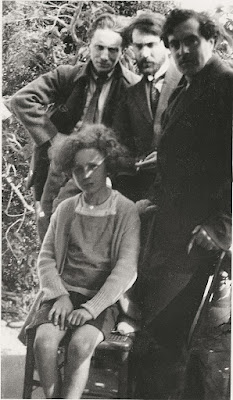Insel der Blutigen Plantage
Insel der Blütigen Plantage (1983), dir Kurt Raab,with Kurt Raab, Peter Kern
This season of Faßbinder films focuses mainly on, what it terms, the Faßbinder group (Gruppenbild mit RWF –Group Portrait with RWF) meaning that a Faßbinder film was, of course, much more than the input of one person, Rainer Werner Faßbinder.
The Faßbinder masterpiece, The Marriage of Maria Braun, was preceded by an unknown work by Kurt Raab (1941-1987), Die Inselder blütigen Plantage (1983) (Island of the BloodyPlantation). Raab clearly intended to cash in on his association with Faßbinder in this abysmal Women in Prison picture, shot mainly in the Phillipines. The film is bad even by the low standards of the genre, a daft plot, weak, wooden acting, almost nothing to commend it. Not even sleaziness, abysmal jokes, rapine or violence, just a central message about the evils of authoritarianism so blatantly put it made this reviewer wince. The film demonstrates how intellectually null and void Raab had become, how eager he must have been to grab money from the general public. Oddly, even though many of the (male) producers of the film were Gay, they seem to totally mishandle the possibilities offered by the film to explore the discourse of femininity and authoritarianism. The film was a financial disaster which tells us that silly, greedy plots to obtain money from the general public by churning out vapid rubbish even when the churners happen to be former chums of a great artist, are generally doomed to be unsuccessful and rightly so. Faßbinder´s films worked because they are (albeit speedily made) poetic, intelligent, insightful, sensitive, interesting. They were made by someone who realised that artistic priorities come first, financial expectations and rewards being secondary. There was no quick way to fame and riches for Faßbinder.
Paul Murphy, Berlin
This season of Faßbinder films focuses mainly on, what it terms, the Faßbinder group (Gruppenbild mit RWF –Group Portrait with RWF) meaning that a Faßbinder film was, of course, much more than the input of one person, Rainer Werner Faßbinder.
The Faßbinder masterpiece, The Marriage of Maria Braun, was preceded by an unknown work by Kurt Raab (1941-1987), Die Inselder blütigen Plantage (1983) (Island of the BloodyPlantation). Raab clearly intended to cash in on his association with Faßbinder in this abysmal Women in Prison picture, shot mainly in the Phillipines. The film is bad even by the low standards of the genre, a daft plot, weak, wooden acting, almost nothing to commend it. Not even sleaziness, abysmal jokes, rapine or violence, just a central message about the evils of authoritarianism so blatantly put it made this reviewer wince. The film demonstrates how intellectually null and void Raab had become, how eager he must have been to grab money from the general public. Oddly, even though many of the (male) producers of the film were Gay, they seem to totally mishandle the possibilities offered by the film to explore the discourse of femininity and authoritarianism. The film was a financial disaster which tells us that silly, greedy plots to obtain money from the general public by churning out vapid rubbish even when the churners happen to be former chums of a great artist, are generally doomed to be unsuccessful and rightly so. Faßbinder´s films worked because they are (albeit speedily made) poetic, intelligent, insightful, sensitive, interesting. They were made by someone who realised that artistic priorities come first, financial expectations and rewards being secondary. There was no quick way to fame and riches for Faßbinder.
Paul Murphy, Berlin

Comments